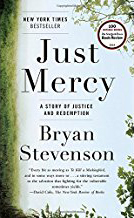
Reviewed by: James G. Apple, Editor-in-Chief, International
Judicial Monitor
In a recent issue of Time magazine, the featured
article was “The 100 Most Influential People in the World.” The selections
were made by 100 persons who are themselves influential, or at least well known
in the particular field of the selectee. The selectees do not have to be persons who are admired, but
just influential. For that reason, there are some dark choices among many
luminaries, such as Kim Jong Un, leader of North Korea. Also in the article are
some quoted commentaries by the selectees answering the question “What inspires
the Time 100? One of the selectees, an actor and producer, Lena Waithe,
answered the question by referring to Bryan Stephenson’s book Just Mercy.
She stated “This book should be required reading for every human being on this
planet.” That statement is probably the ultimate accolade for a writer.
Without discussing whether this book should be distributed
for world-wide perusal by every person, it is a book that should be required
reading for judges, lawyers, prosecutors, police officials, jurists, law
professors, law students and others who participate in rule of law activities,
not just in the U.S. but around the world. It teaches what justice means “on
the ground” rather than in the library and classroom.
The venue for the accounts of cases and trials in the book
is mostly in the southeastern states of the United States. The accounts
provide a totally damning picture of criminal justice systems in these states,
most of which were part of the Confederate States of America (CSA) during the
U.S. Civil War. And the centerpiece of this slice of United States geography is
the State of Alabama, once the location of the capitol of the CSA and the place where
the main story in the book takes place.
The author of this title, Bryan Stephenson, is a unique
individual. He is an African American, educated at Harvard Law School and the
Kennedy School of Government at Harvard, who eschewed the financial and other
attractions of life in a major law firm in New York or Washington, or teaching in a prestigious
law school. He chose working among the criminal justice systems in the south of
the United states, with an aim of assisting those persons who had been wronged
in their treatment before and during trials and thereafter. He approached his
selection of a career with a passion and ability that is seldom seen, certainly
in the criminal justice arena. His first job was with the Southern Prisoners
Defense Committee in Atlanta, Georgia. He later transferred to Montgomery, the
capitol of Alabama, where he founded the Equal Justice Initiative, an
organization dedicated to assisting condemned prisoners and others who may have
been wronged by police, prosecutors and judges.
Stephenson was the founder and chief fund raiser for the
National Memorial of Peace and Justice in Montgomery recently completed, dedicated to
“the legacy of enslaved black people, people terrorized by lynching, African
Americans humiliated by racial segregation and Jim Crow, and people of color
burdened with contemporary presumptions of guilt and police violence.”
The book, written in a highly readable style, centers around
one of Stephenson’s memorable cases, the conviction and death penalty sentence
for a black resident of a rural Alabama town named Walter McMillian. The
conviction was made on the sparsest of evidence of two witnesses, both tainted,
against six alibi witnesses. The case was submitted to the jury made up of all
white jurors (caused by the action of the prosecutor in excluding blacks from
the jury) and the jury returned a verdict of guilty with a recommendation of
life imprisonment. The judge, however, overruled the jury’s recommendation and
imposed the death penalty, which is permissible under Alabama law. Stevenson
eventually had the verdict and sentence overturned in the Alabama Court of
Criminal Appeals, after the case had been reviewed in a popular television
show.
Stevenson’s activities in death penalty cases over a 30 year
period has saved 125 men from that outcome.
The account of this case in the book is given in segments,
surrounded by accounts of other trials with similar defects, by Stevenson’s
activities in opposing the death penalty in the United States, and by other
criminal justice reforms he has advocated. Stephenson’s style works, and the
reader is captivated by the narrative.
Stevenson has deservedly received many honors and awards,
including a MacArthur Foundation Genius award and honorary degrees from at
least 11 colleges and universities. His book has won six national book prizes.
Books like Just Mercy do not “come along” very often.
It is an exceptional piece of writing, and deserves a place of honor in the libraries of
judges and others acting in support of the rule of law.

 International
Judicial Monitor
International
Judicial Monitor